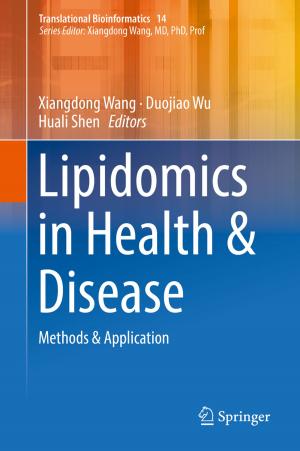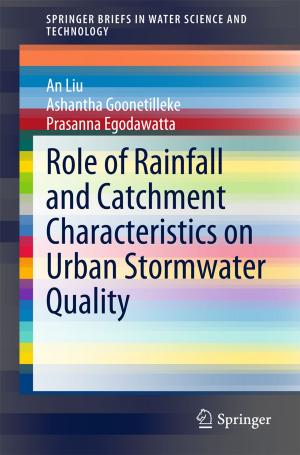Agriculturally Important Microbes for Sustainable Agriculture
Volume I: Plant-soil-microbe nexus
Nonfiction, Science & Nature, Science, Biological Sciences, Botany, Technology, Agriculture & Animal Husbandry| Author: | ISBN: | 9789811055898 | |
| Publisher: | Springer Singapore | Publication: | September 18, 2017 |
| Imprint: | Springer | Language: | English |
| Author: | |
| ISBN: | 9789811055898 |
| Publisher: | Springer Singapore |
| Publication: | September 18, 2017 |
| Imprint: | Springer |
| Language: | English |
This book presents a compilation of case studies from different countries on achieving agricultural sustainability. The book stresses that, in order to meet the needs of our rapidly growing population, it is imperative to increase agricultural productivity. If global food production is to keep pace with an increasing population, while formulating new food production strategies for developing countries, the great challenge for modern societies is to boost agricultural productivity. Today, the application of chemicals to enhance plant growth or induced resistance in plants is limited due to the negative effects of chemical treatment and the difficulty of determining the optimal concentrations to benefit the plant.
In the search for alternative means to solve these problems, biological applications have been extensively studied. Naturally occurring plant-microbe-environment interactions are utilized in many ways to enhance plant productivity. As such, a greater understanding of how plants and microbes coexist and benefit one another can yield new strategies to improve plant productivity in the most sustainable way. Developing sustainable agricultural practices requires understanding both the basic and applied aspects of agriculturally important microorganisms, with a focus on transforming agricultural systems from being nutrient-deficient to nutrient-rich.
This work is divided into two volumes, the aim being to provide a comprehensive description and to highlight a holistic approach, respectively. Taken together, the two volumes address the fundamentals, applications, research trends and new prospects of agricultural sustainability.
Volume one consists of two sections, with the first addressing the role of microbes in sustainability, and the second exploring beneficial soil microbe interaction in several economically important crops. Section I elucidates various mechanisms and beneficial natural processes that enhance soil fertility and create rhizospheric conditions favourable for high fertility and sustainable soil flora. It examines the mechanism of action and importance of rhizobacteria and mycorrhizal associations in soil. In turn, section II presents selected case studies involving economically important crops. This section explains how agriculturally beneficial microbes have been utilized in sustainable cultivation with high productivity. Sustainable food production without degrading the soil and environmental quality is a major priority throughout the world, making this book a timely addition. It offers a comprehensive collection of information that will benefit students and researchers working in the field of rhizospheric mechanisms, agricultural microbiology, biotechnology, agronomy and sustainable agriculture, as well as policymakers in the area of food security and sustainable agriculture.
This book presents a compilation of case studies from different countries on achieving agricultural sustainability. The book stresses that, in order to meet the needs of our rapidly growing population, it is imperative to increase agricultural productivity. If global food production is to keep pace with an increasing population, while formulating new food production strategies for developing countries, the great challenge for modern societies is to boost agricultural productivity. Today, the application of chemicals to enhance plant growth or induced resistance in plants is limited due to the negative effects of chemical treatment and the difficulty of determining the optimal concentrations to benefit the plant.
In the search for alternative means to solve these problems, biological applications have been extensively studied. Naturally occurring plant-microbe-environment interactions are utilized in many ways to enhance plant productivity. As such, a greater understanding of how plants and microbes coexist and benefit one another can yield new strategies to improve plant productivity in the most sustainable way. Developing sustainable agricultural practices requires understanding both the basic and applied aspects of agriculturally important microorganisms, with a focus on transforming agricultural systems from being nutrient-deficient to nutrient-rich.
This work is divided into two volumes, the aim being to provide a comprehensive description and to highlight a holistic approach, respectively. Taken together, the two volumes address the fundamentals, applications, research trends and new prospects of agricultural sustainability.
Volume one consists of two sections, with the first addressing the role of microbes in sustainability, and the second exploring beneficial soil microbe interaction in several economically important crops. Section I elucidates various mechanisms and beneficial natural processes that enhance soil fertility and create rhizospheric conditions favourable for high fertility and sustainable soil flora. It examines the mechanism of action and importance of rhizobacteria and mycorrhizal associations in soil. In turn, section II presents selected case studies involving economically important crops. This section explains how agriculturally beneficial microbes have been utilized in sustainable cultivation with high productivity. Sustainable food production without degrading the soil and environmental quality is a major priority throughout the world, making this book a timely addition. It offers a comprehensive collection of information that will benefit students and researchers working in the field of rhizospheric mechanisms, agricultural microbiology, biotechnology, agronomy and sustainable agriculture, as well as policymakers in the area of food security and sustainable agriculture.















